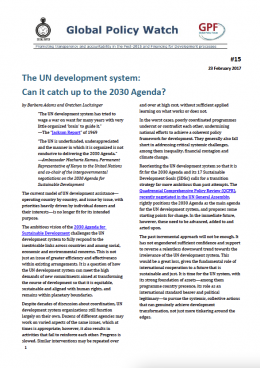By Barbara Adams and Gretchen Luchsinger
The current model of UN development assistance—operating country by country, and issue by issue, with priorities heavily driven by individual donors and their interests—is no longer fit for its intended purpose.
The ambitious vision of the 2030 Agenda for Sustainable Development challenges the UN development system to fully respond to the inextricable links across countries and among social, economic and environmental concerns. This is not just an issue of greater efficiency and effectiveness within existing arrangements. It is a question of how the UN development system can meet the high demands of new commitments aimed at transforming the course of development so that it is equitable, sustainable and aligned with human rights, and remains within planetary boundaries.
Despite decades of discussion about coordination, UN development system organizations still function largely on their own. Dozens of different agencies may work on varied aspects of the same issues, which at times is appropriate; however, it also results in activities that fail to reinforce each other. Progress is slowed. Similar interventions may be repeated over and over at high cost, without sufficient applied learning on what works or does not.
In the worst cases, poorly coordinated programmes undercut or contradict each other, undermining national efforts to achieve a coherent policy framework for development. They generally also fall short in addressing critical systemic challenges, among them inequality, financial contagion and climate change.

